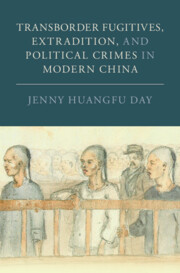Book contents
- Transborder Fugitives, Extradition, and Political Crimes in Modern China
- Studies in Legal History
- Transborder Fugitives, Extradition, and Political Crimes in Modern China
- Copyright page
- Contents
- Figures and Tables
- Acknowledgments
- 1 Introduction
- 2 The Origin of the “Political Offense Exception” in Sino-British Extradition
- 3 The Debate over Judicial Torture and the Failure of Extradition
- 4 Law and Justice at the Interstices of Empires
- 5 The Invention of the “Political Offender”
- 6 The Rise of Guoshifan and the Qing’s Penal Code Reform
- 7 Republican China’s Quest for Judicial Sovereignty and the Criminalization of Communism
- 8 Epilogue
- Glossary
- Notes
- Bibliography
- Index
- Studies in Legal History
2 - The Origin of the “Political Offense Exception” in Sino-British Extradition
Published online by Cambridge University Press: 10 November 2025
- Transborder Fugitives, Extradition, and Political Crimes in Modern China
- Studies in Legal History
- Transborder Fugitives, Extradition, and Political Crimes in Modern China
- Copyright page
- Contents
- Figures and Tables
- Acknowledgments
- 1 Introduction
- 2 The Origin of the “Political Offense Exception” in Sino-British Extradition
- 3 The Debate over Judicial Torture and the Failure of Extradition
- 4 Law and Justice at the Interstices of Empires
- 5 The Invention of the “Political Offender”
- 6 The Rise of Guoshifan and the Qing’s Penal Code Reform
- 7 Republican China’s Quest for Judicial Sovereignty and the Criminalization of Communism
- 8 Epilogue
- Glossary
- Notes
- Bibliography
- Index
- Studies in Legal History
Summary
This chapter focuses on the legal ramifications of the rendition of Taiping Lieutenant Hou Yutian (mistakenly identified as Mo Wang) by the Hong Kong government to the Canton administration in 1865. This case was the first to reveal the tension between the Treaty of Tianjin (1858) and colonial law regarding fugitive rendition. The strong reaction of the British public to the execution of Hou by “lingering death” led to Britain’s amendment of its fugitive rendition procedure under the Treaty of Tianjin. The British government henceforth no longer considered “political offenses” as an extraditable crime to China and stipulated that no prisoner could be surrendered without a guarantee by the Chinese government of a “fair trial” and a pledge not to use any torture. While the Qing government accepted the amendment as an act of expediency, the British Foreign Office interpreted it as an acquiescence to British rules of extradition and the Political Offense Exception (POE).
Keywords
Information
- Type
- Chapter
- Information
- Publisher: Cambridge University PressPrint publication year: 2025
Accessibility standard: Inaccessible, or known limited accessibility
Why this information is here
This section outlines the accessibility features of this content - including support for screen readers, full keyboard navigation and high-contrast display options. This may not be relevant for you.Accessibility Information
Content Navigation
Allows you to navigate directly to chapters, sections, or non‐text items through a linked table of contents, reducing the need for extensive scrolling.
Provides an interactive index, letting you go straight to where a term or subject appears in the text without manual searching.
Reading Order & Textual Equivalents
You will encounter all content (including footnotes, captions, etc.) in a clear, sequential flow, making it easier to follow with assistive tools like screen readers.
You get concise descriptions (for images, charts, or media clips), ensuring you do not miss crucial information when visual or audio elements are not accessible.
Structural and Technical Features
You gain clarity from ARIA (Accessible Rich Internet Applications) roles and attributes, as they help assistive technologies interpret how each part of the content functions.
